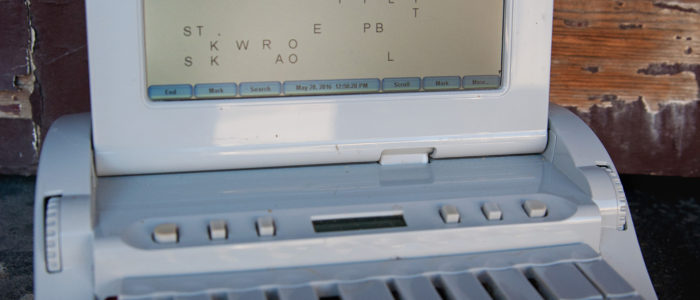Best Online Courses to Become a Qualified Court Typist
Best Online Courses to Become a Qualified Court Typist
Blog Article
Discover the Necessary Abilities and Responsibilities of a Court Typist in Today's Lawful Landscape
As a court typist, you hold an essential placement in the lawful system. Your abilities go beyond simply keying; they involve understanding complex lawful terms and treatments while making sure precision in every document. You work together closely with courts and attorneys, making your function vital for reliable communication. However what specific skills do you require, and how can you adapt to the ever-evolving technical landscape? Allow's explore this additionally.
The Function of a Court Typist in the Judicial System
As the foundation of the judicial system, a court typist plays an important duty in guaranteeing that lawful proceedings are properly documented. You are in charge of recording everything from witness statements to courts' rulings, capturing every detail with precision. Your job aids keep a clear and irreversible document of court activities, which is vital for future recommendation and appeals.In the court room, you're frequently the unsung hero, silently assuring that all talked words become created documents. You maintain discretion, comprehending the sensitive nature of legal issues. You likewise work together closely with clerks, judges, and attorneys to ensure the smooth flow of info. By functioning efficiently under pressure, you add to the overall efficiency of the judicial procedure. Your interest to detail and commitment to precision not just support the integrity of the court but additionally sustain the wider pursuit of justice in society.
Vital Abilities Required for Court Typists
Court typists require a distinct mix of skills to master their necessary duty within the judicial system. You need to have outstanding typing abilities, often achieving rates of 70 words per min or more. Precision is crucial; also a minor error can lead to considerable misunderstandings in legal files. You'll additionally need solid focus to detail, making sure every word is transcribed correctly.Additionally, great business skills are essential for taking care of numerous cases and documents successfully. Being tech-savvy is essential, as you'll make use of different software programs for word handling and paper monitoring. Solid communication abilities help you engage with judges, legal representatives, and other court workers effectively.Lastly, a feeling of expertise and privacy is a must, as you'll take care of sensitive info daily. By refining these abilities, you'll be well-prepared to contribute significantly to the court room setting.
Understanding Lawful Terminology and Procedures
As a court typist, you need to grasp essential lawful terms and procedures to do your work successfully. Recognizing these ideas not just aids you transcribe precisely however also assures you can adhere to the flow of court process. Let's check out the crucial legal vocabulary and an introduction of court procedures you should know.

Key Legal Terms
Comprehending essential lawful terms is vital for anyone operating in a court environment. You'll frequently run into terms like "complainant," which refers to the individual launching a lawsuit, and "offender," who reacts to the claims. Understanding the difference in between "civil" and "criminal" situations helps you grasp the context of the proceedings. Familiarity with "subpoena" guarantees you recognize the legal documents compelling witnesses to indicate. Furthermore, terms like "proof" and "testament" are crucial, as they associate directly to the information presented in court. Understanding these terms not just enhances your efficiency as a court typist however also ensures that you contribute to the accuracy and quality of legal documents. Your duty hinges on specific terminology, so do not take it lightly!
Court Procedures Summary
Knowledge with vital legal terms establishes the stage for understanding court procedures. Recognizing exactly how a court room functions is essential for any kind of court typist. You'll experience processes like arraignments, where offenders listen to charges, and movements, which are demands for a court ruling. Familiarize on your own with the roles of clerks, courts, and lawyers, as each plays a critical part in procedures. Knowing the circulation of a test-- from court selection to closing arguments-- helps you precisely record the process - court typist. Additionally, recognizing the importance of preserving a impartial and precise document can't be overstated. By grasping these components, you'll boost your effectiveness in recording crucial court activities and contribute substantially to the lawful procedure. Your role is important in preserving the integrity of court records
The Impact of Technology on Court Typing
Technology's transformed court typing in significant ways. With electronic transcription tools, you can raise performance and accuracy, making your task much easier than discover this ever. Plus, remote court proceedings have changed just how you approach your work, needing flexibility to brand-new styles and modern technologies.
Digital Transcription Devices
As digital transcription devices proceed to evolve, they're changing the method court typists perform their responsibilities. These devices streamline the transcription process, allowing you to record spoken words properly and effectively. With voice recognition software, you can record real-time procedures, reducing manual input and reducing errors.Moreover, cloud-based systems allow very easy access to documents, so you can function collaboratively with legal groups and ensure everybody's on the same web page. Automated formatting functions save you time on recurring tasks, allowing you focus on content quality.Additionally, electronic devices improve protection, protecting delicate details with encrypted storage space and regulated accessibility. By embracing these innovations, you can improve your productivity and keep the high requirements needed in the legal area.
Remote Court Proceedings
The rise of remote court process has significantly transformed the landscape for court typists. You now depend on technology to record and transcribe real-time hearings from your office or home. Knowledge with video conferencing systems is crucial, as you'll need to browse them flawlessly to guarantee an exact document. You'll also have to take care of audio top quality, as background noise or link problems can interrupt your work. Furthermore, remote procedures require fast reasoning; you might require to clear up declarations or demand repeats in real-time. Remaining organized and reliable is essential, as deadlines remain tight. Welcoming these technical advancements not only boosts your skills but likewise ensures you remain an important possession in today's progressing lawful environment.
Precision and Focus to Information in Transcription
Precision and interest to detail are crucial in transcription, specifically for court typists. court typist. When you're recording legal procedures, every word counts. A solitary blunder can modify the meaning of a statement, potentially affecting the outcome of an instance. You must listen carefully, assuring that you record every subtlety and inflection in the speaker's voice.Your ability to capture typos and grammatical errors is crucial. You do not just kind; you validate that the final record is a precise depiction of what was claimed in court. This needs a keen eye and an extensive understanding of lawful terminology.Moreover, you'll require to be knowledgeable about various accents and speaking designs, as court rooms can hold a variety of audio speakers. By honing your accuracy and interest to detail, you'll keep the stability of lawful documents and add significantly to the judicial process. Your diligence in this area genuinely makes a difference

Time Administration and Business Skills
While taking care of multiple jobs, efficient time administration and business abilities are crucial for court typists. You'll typically juggle various due dates, from recording court procedures to preparing legal records. Prioritizing your workload is necessary; determine immediate jobs and tackle them initially to guarantee timely submissions.Organizational abilities come into play when you're arranging through situation transcripts, documents, and notes. Keeping whatever neatly classified not only conserves time however likewise minimizes the threat of error. Utilizing devices like calendars, to-do checklists, or specialized software application can assist you remain on track and handle your time effectively.Moreover, setting certain goals for every job session can enhance your productivity. Damage bigger jobs right into smaller tasks to make them extra convenient. By honing these abilities, you'll not just improve your efficiency yet also contribute considerably to the smooth procedure of the legal process, assuring everything runs like clockwork.
Continuing Education and Professional Advancement Opportunities
Purchasing your abilities does not quit with time administration and organization. As a court typist, you'll find that proceeding education and learning and expert growth are necessary to staying competitive in the lawful field. Search for workshops or on the internet training courses concentrating on advanced keying techniques, legal terms, and transcription software application. These can hone your skills and help you adapt to the current technologies.Networking is equally important. Join expert organizations like the National Court Reporters Association (NCRA) or neighborhood legal organizations. They commonly supply sources, training sessions, and conferences that can improve your understanding and link you with peers.Don' t neglect about accreditation programs that can improve your reliability and marketability. Remaining upgraded with the most up to date fads and finest methods in lawful documentation will certainly boost your efficiency and accuracy, making you a vital asset to any kind of lawful group. Purchase your development, and you'll gain the benefits throughout your profession.
Frequently Asked Questions
What Is the Common Wage Array for a Court Typist?
A court typist's common income ranges from $30,000 to $55,000 annually, depending on experience and area. You might additionally locate opportunities for development with additional abilities, resulting in increased pay in the lawful field.

Are Court Typists Required to Have a Legal Degree?
Court typists don't need a legal degree, but having one can be useful. You'll frequently find click for more that solid keying skills and expertise of lawful terms are a lot more crucial for success in this duty.
What Are the Job Hours for a Court Typist?

Exactly How Do Court Typists Make Certain Privacy in Their Work?
You ensure discretion by safely dealing with sensitive records, utilizing encrypted software application, and following strict methods. You stay knowledgeable about privacy legislations and only share details with licensed employees, maintaining count on in the judicial process.
Can Court Typists Job From Another Location or Freelance?
Yes, you can work remotely or freelance as a court typist, especially if you have reliable modern technology and a protected setting. Numerous lawyers currently embrace remote work, offering flexibility and chances for independent typists. As the backbone of the judicial system, a court typist plays a vital role in assuring that legal proceedings are accurately recorded. As a court typist, you require to understand crucial legal terms and treatments to do your job properly. Understanding these terms not only enhances your effectiveness as a court typist but also guarantees that you add to the precision and clarity of lawful papers. The surge of remote court process has substantially altered the landscape for court typists. As a court typist, you'll locate that proceeding education and learning and additional resources professional growth are important to remaining affordable in the lawful field.
Report this page